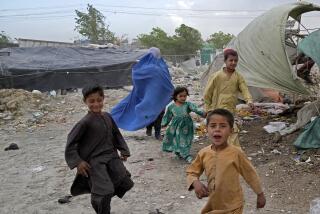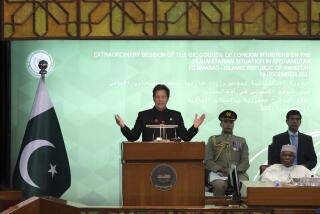Afghans Gird for Battle Over Constitution
- Share via
KABUL, Afghanistan — Grasping for the promise of the first democracy in Afghanistan’s long, tortured history, delegates began a fierce debate on a new constitution today.
A loya jirga, or traditional grand assembly, convened amid tight security in a large white tent on the edge of the capital, in the shadow of hillside shanties where Afghans live without electricity and haul their daily water up dirt paths in pails. Mohammad Zaher Shah, the former king, inaugurated the session.
Delegates said the central issue was whether power should be concentrated in the hands of the presidency or shared with a parliament and prime minister. Many delegates are also demanding that the constitution explicitly declare that Afghanistan will be ruled by Sharia, or Islamic law, and that guarantees of women’s rights be weakened.
Numerous critics inside and outside Afghanistan have complained that the draft constitution that President Hamid Karzai wants is undemocratic.
The proposed constitution is deeply flawed because it wouldn’t provide power-sharing, a system of checks and balances, or ways to increase representation of minority groups, the Brussels-based International Crisis Group said in a report released Saturday.
“The manner in which the draft has been prepared and publicized, as well as its content, raise serious questions about whether it can become the first constitution in Afghanistan’s history to command genuinely deep popular support and, therefore, contribute to national stability,” the report said.
Karzai and his officials have said they are confident the draft constitution will be approved, perhaps with some amendments. Karzai says he won’t run for election unless the presidential powers set out in the draft are approved.
“Many Afghans and other observers believe that the major decisions have already been taken behind the scenes, and President Karzai has expressed the hope that the constitutional loya jirga will conclude its business within a week to 10 days,” the International Crisis Group said.
“There are indications, however, that delegates may wish to make use of their prerogative to change the document, and United Nations special representative Lakhdar Brahimi has predicted a ‘difficult’ debate.”
The government said the process of drafting the constitution was the most democratic in Afghan history. The draft was backed by a 53-member commission appointed by Karzai, and discussed in more than 556 meetings with an estimated 178,000 Afghans, 19% of whom are women.
But the ICG report said the draft was discussed with focus groups that didn’t fully represent the nation’s ethnic and regional diversity. Revisions to the text further concentrated power in the presidency, it added.
“The draft’s virtually unchecked concentration of power in the presidency has prompted nearly universal criticism in Afghanistan from across the political spectrum,” the report said.
Last week, U.S. Ambassador Zalmay Khalilzad said he was “reasonably optimistic that the loya jirga and Afghans will decide on a good document for themselves.”
“My sense, however broad, is that a variety of groups with different ideas will be represented, but the dominant tendency is likely to be to move forward,” the ambassador told reporters. “There may be some changes to the draft. That’s to be expected.”
Afghans are discussing issues such as the role of religion, women’s rights and the balance of power between the central and regional governments that they have never debated so freely in 5,000 years, Khalilzad said.
Approving a new constitution is the next step in Afghanistan’s troubled path to democracy after more than 24 years of war. In Washington, U.S. officials have said privately that they are concerned that continued fighting in parts of the country may delay elections scheduled for June.
“It would be ideal if presidential and parliamentary elections can be held at the same time,” the ambassador said. “But whether both can be held simultaneously, as a practical matter, that’s an issue that the Afghans have to deal with.”
If Karzai does get the constitution he wants, he will then face the tough job of convincing its many opponents that he didn’t buy the needed delegates, and that the new system of government is what most ordinary Afghans really want.
Instability is spreading, especially in the east and south where U.S. troops are battling Taliban insurgents and their allies from the Al Qaeda terrorist network and extremist Gulbuddin Hekmatyar’s Hezb-i-Islami faction.
Brahimi, special representative of U.N. Secretary-General Kofi Annan in Afghanistan, warned in a weekend interview with Associated Press that he would recommend the organization withdraw from unsafe areas.
“Countries that are committed to supporting Afghanistan cannot kid themselves and cannot go on expecting us to work in unacceptable security conditions,” Brahimi said. “They seem to think that our presence is important here. Well, if they do, they have got to make sure that the conditions for us to be here are there. If not, we will go away.”
On Thursday, Brahimi called on foreign governments to convene a second summit with Afghan leaders to underscore an urgency to “address squarely the challenges that lie ahead and threaten to block the path to peace.”
A similar summit near Bonn two years ago confirmed Karzai as interim president and set down a timetable leading to the June elections, Afghanistan’s first.
Brahimi said a second summit was needed to come up with ways to make the government more representative, and to promote national unity. The meeting would also deal with the slow pace of reconstruction.
Foreign donors have failed to provide enough money to “rebuild a peaceful and stable Afghanistan,” the U.N. warned.
More to Read
Sign up for Essential California
The most important California stories and recommendations in your inbox every morning.
You may occasionally receive promotional content from the Los Angeles Times.













